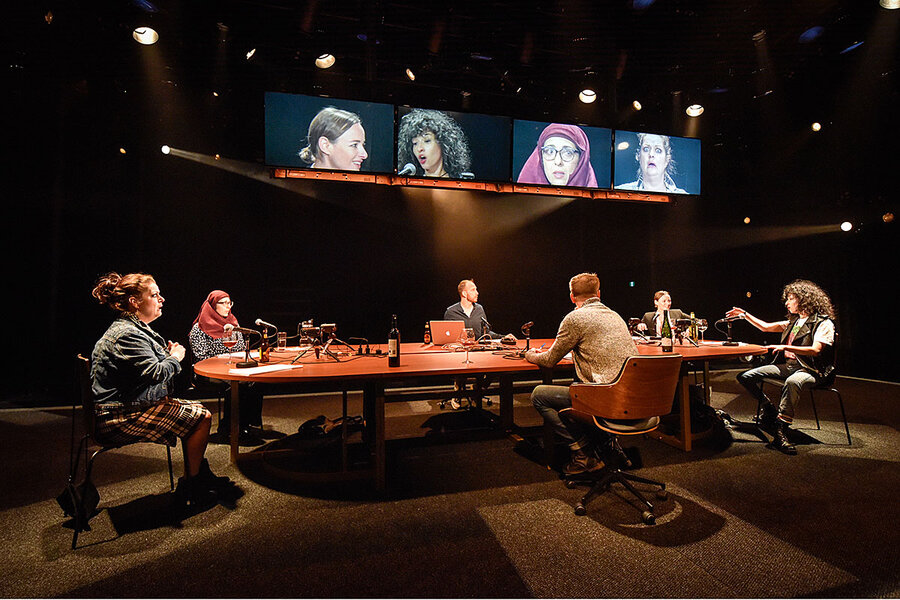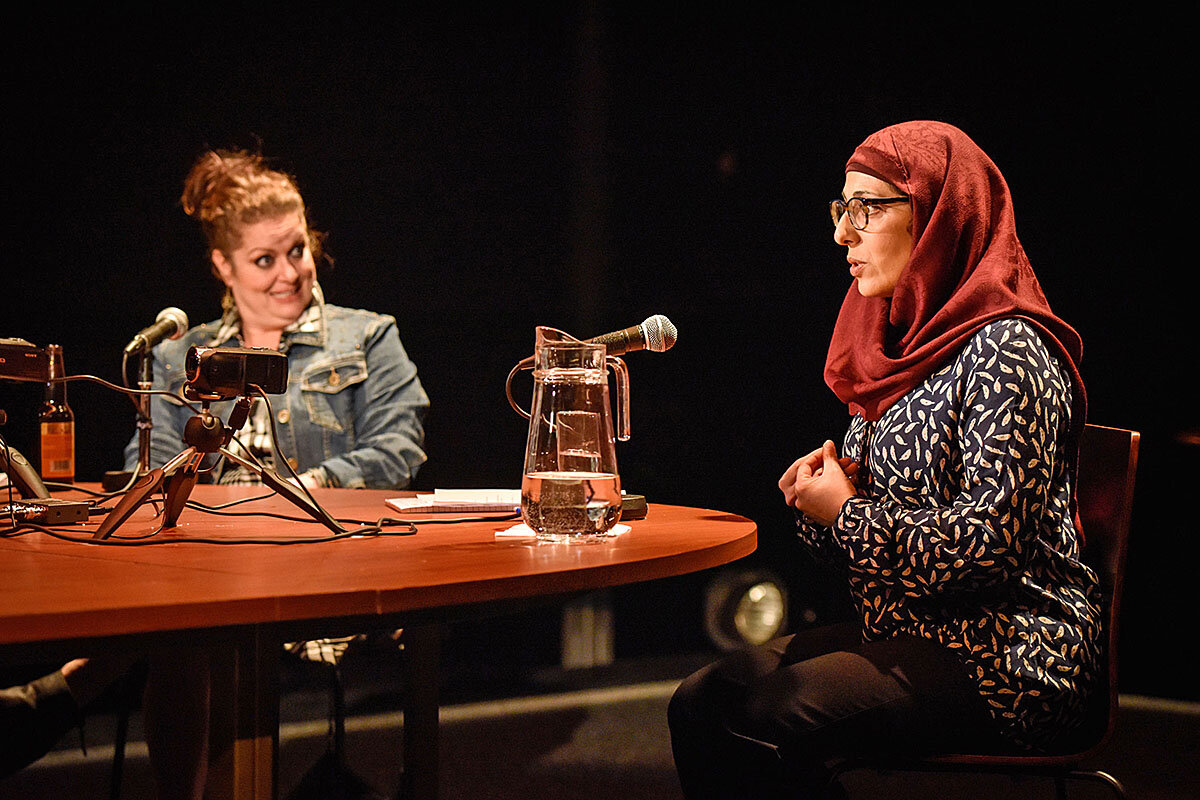At a dinner party play in Quebec, politics is the main course
Loading...
| Montreal
Politics is forbidden at many dinner tables, but at a dinner party production in Quebec, it is the very point. The play “L’Assemblée” is the verbatim dialogue of four French-speaking Quebecers from wildly different political and cultural backgrounds during a “dinner party.” The team behind the production came up with the idea of inviting four strangers to the table after witnessing the polarization in the 2016 US presidential race. The conversation that unfolded among the four – spanning issues including Muslim immigration, the veil, integration, and identity – is edited and acted as the central production. The play, which manages to infuse humor within the discomfort of clashing views, is intended as a snapshot of the current political moment – not to sway people to other views but to get them to literally “stay at the table,” says playwright and Porte Parole artistic director Annabel Soutar. “ ‘The Assembly’ is an attempt to rebuild one part of democratic institutions, which is the spaces where we gather face to face to talk about politics....”
Why We Wrote This
During times of intense political polarization, meaningful dialogue often suffers. In Canada, a theatrical “dinner party” offers a radical idea: an opportunity to transcend differences by simply listening.
The character named Riham, a Quebec resident of Egyptian descent, has spent the better part of the evening around the dinner table defending her choices, particularly around her veil and what it means to her as a practicing Muslim.
This dinner gathering is actually a play, a heated discussion between actors representing different political and cultural backgrounds. It ends with Riham’s frustrated question to another character who believes Muslim immigration is the threat to Canadian society. “My question is, what is it to be integrated? As a Canadian, as a Quebecer?” she pleads. “I’m bilingual. Most of my friends are not from my religion or my culture. What else can I do?”
It’s a tense moment for the crowd here in Montreal, for it’s as if Riham is speaking personally to each audience member at a time when the subjects of immigration, religious accommodation, identity, and feminism have found themselves around many a local dinner table recently. And in fact Riham is not just a character played by an actress on a stage but a real-life Quebecer – or immigrant in Quebec, depending on one’s point of view – wading through the controversial proposals by new provincial leader François Legault, including French language tests for immigrants and forgoing religious symbols for some civil servants.
Why We Wrote This
During times of intense political polarization, meaningful dialogue often suffers. In Canada, a theatrical “dinner party” offers a radical idea: an opportunity to transcend differences by simply listening.
The play, “L’Assemblée,” is the verbatim dialogue of four French-speaking Quebecers during a supper hosted by the documentary theater company Porte Parole. The group also invited four English-language speakers to a different dinner, producing “The Assembly, ” an entirely distinct production (more on that later).
The plays, which manage to infuse humor within the discomfort of clashing views, are intended as snapshots of the current political moment – not to sway people to other views but to get them to literally “stay at the table,” says playwright and Porte Parole artistic director Annabel Soutar. “ ‘The Assembly’ is an attempt to rebuild one part of democratic institutions, which is the spaces where we gather face-to-face to talk about politics, and which is in ruins right now,” she says.
If politics is forbidden at your table, say during Thanksgiving dinner, here it is the very point. Ms. Soutar, along with actors and co-playwrights Alex Ivanovici and Brett Watson, came up with the idea of inviting four strangers to the table after witnessing the polarization in the 2016 US presidential race. The conversation that unfolded among the four is edited and acted as the central production.
In the second part of the play, the actors leave the stage and the audience is invited onstage to mount their own “assembly.” They are welcome to fill the now vacant chairs and share their views on polarization or their individual experiences, and engage in debate with the others at the table. The discussion is left entirely up to the audience, without any guidance from the cast or crew, so it can take some time for the participants to get talking – but when they do, the cast has to come back and usher them off the stage to get them to stop.
An exercise in understanding
For an outsider to both Quebec and Canada, the comparison between the two plays – English and French – is almost as fascinating as the plays themselves. While both revolve around tribalism and identity politics, with Muslim immigration at the crux of it, the English-language one is fixated southward. Canada is grappling with its own populism, but President Trump’s America is a main theme in the English-language play, and thus it feels easier to listen to, as if it’s someone else’s problem.
In the French version, it’s Muslim immigration, veiled women, and French language and culture that dominate the conversation. These are the issues that have split Quebec for decades. They have been exacerbated by recent flows of asylum seekers crossing into Canada from the US, adding fuel to the debate about how to preserve French-Canadian identity, which some feel is under new threat from recent tides of immigration. The French play feels more intimate, harder to bear.
The “L’Assemblée” cast is also all-female, a wink to the feminist founding of the theater, Espace Go. Soutar says the conversation in the French play amounted to more of a “slow boil,” while the English-speakers clashed right away, reflecting deep, cultural differences among Francophones and Anglophones in Quebec.
In “The Assembly,” a woman named Valerie, a Trump supporter who belongs to a group in Canada that sees Muslim immigration as the main threat to western society today, dominates the conversation. That was a problem for some. A theater review in the Globe and Mail panned the production for giving Valerie a platform and turning “extremism into entertainment.”
And yet in the second section of each play, when the audience is asked to participate, many said they surprised themselves by empathizing with characters like Valerie, who hold views that they do not agree with. Which is the very point of the theatrical exercise – to understand the person behind a point of view.
In the French-language play, a man from Algeria is the first to mount the stage, pointing to his veiled wife in the audience. He is asked by another participant onstage if he feels optimistic, given the state of debate over Muslim immigration. He says he does. After all, he explains, he is an Algerian immigrant at the table, sharing his views with a large Montreal audience. They let out a “bravo!”
At times, the audience-led portion of the play drags, as if it is a group therapy session or a series of monologues. But without it, the play wouldn't have served its purpose. It was a 13-year-old English-speaking girl who hit the nail on the head, making a case for openness and a willingness to hear others. “I don’t know,” she says, stumbling a bit for words. “It’s like we have to adapt our words to other people’s ears, if that makes sense.”
Judging from the loud applause, it does.









